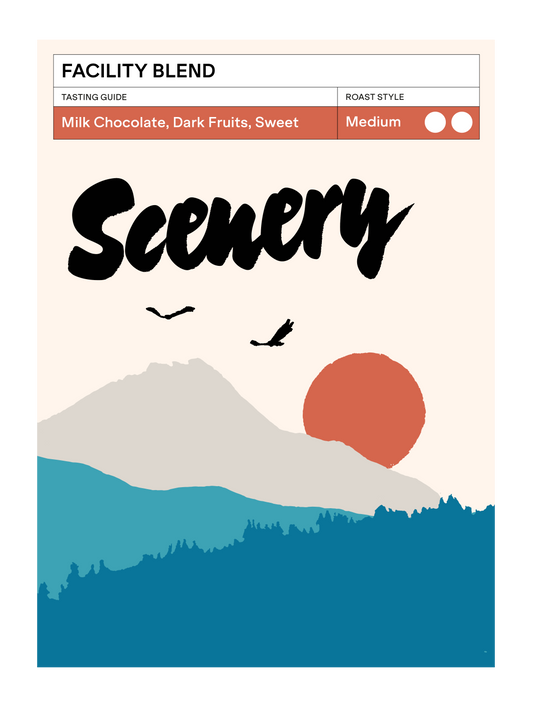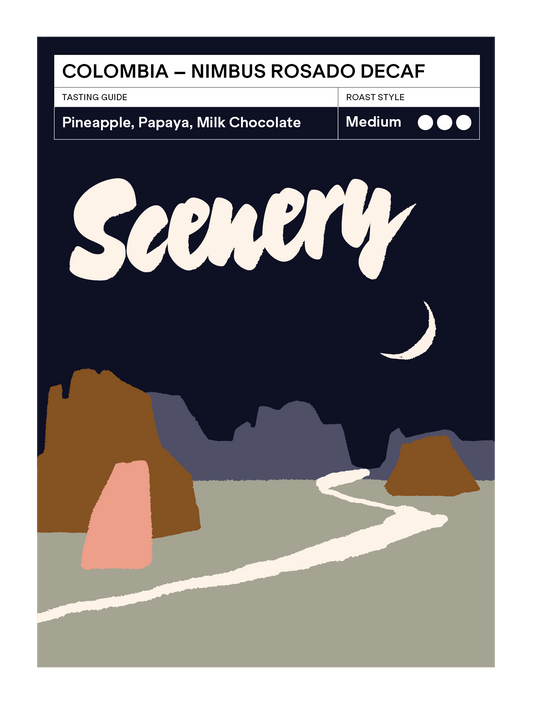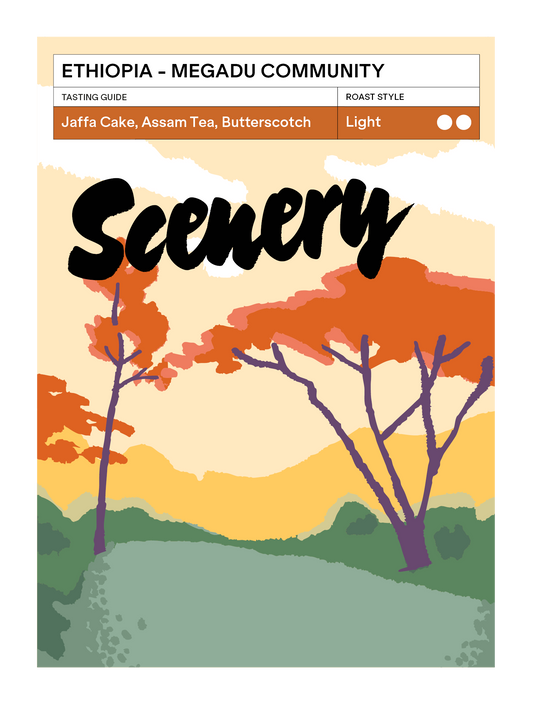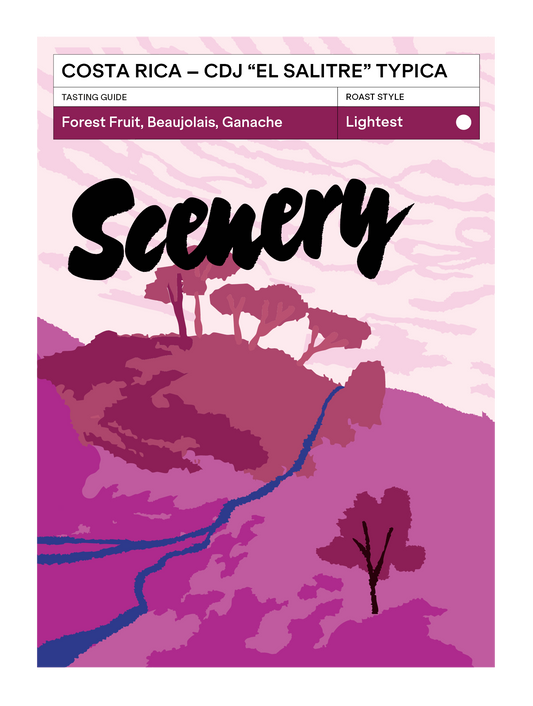We picked this lot up from our pals at Primavera as a fun little run as we wait for our booked lots that are on the water to land. A super nice anoxic natty rosado - can't go wrong. We think it tastes a bit like seedless strawberry jam which is a nostalgic delight. This coffee has been a firm favourite in our roastery mugs since we profiled it, and we don't expect it to last long.
Brew Guide:
Best Brewed with: Filter
Lightest Roast Influence: We find coffees like this can really support a light roast - exposing the super bright red fruits and florals, and presenting it in a cleaner light.
Filter: 64g/L, 96°C Water, with rest we like to move down to 92°C.
Espresso: 18g, 45-48g, 25-30s
Best rested for: 3-4 weeks
We're tasting: Sweet aromatics of strawberry & dried mango, in the cup super creamy mango lassi vibes alongside strawberry jam, as it cools becoming strawberry & hint pulpy cascara, all supported by a white chocolate sweetness and elderflower florality
Traceability:
Country of Origin: |
Colombia |
Region: |
Vereda Los Olivos, Palestina, Huila |
Farm: |
La Piragua |
Producer: |
Alexander Vargas Osorio |
Variety: |
Rosado |
Elevation: |
1800 MASL |
Process: |
Anoxic Natural: Ripe cherries picked and taken to the central processing centre at La Piragua, before floating. After checking the brix content to plan the fermentation, there is an initial 76 hr aerobic fermentation; after which the cherries are placed in sealed tanks with degassing valves and fermented in an anoxic environment for 96 hours. Cherries then removed and spread on raised beds to dry over 20 days |
Import Partner: |
Primavera |
Harvest: |
24/25 - Arrived UK: Jan 16th 2025
|
The Story
We're growing to really love coffees from Palestina in Huila. The lots from this municipality keep absolutely delighting us. Colombia not only has some of the most advanced coffee processing techniques in the world, but it also has a huge diversity of microclimates across the coffee growing regions. Between the processing, the variety access, the microclimates and the two* harvest periods - if you only had to drink one origin for the rest of your life and not get bored, Colombia might be a safe bet.
Palestina is in southern Huila, where the Central and Eastern Andes ranges meet in the Magdalena river valley. The area benefits from mild temperatures, nitrogen-rich volcanic soil, and steep elevation changes. It's a watershed where alongside being the source of the Magdalena river, there are many tributaries and watercourses.
It's the small things that seperate the microclimates of each Colombian region, but then again it's the details that matter - we keep noticing that coffees from here stand out that little bit more, that little twinkle of extra acidity and character on the cupping table. We weren't at all surprised when we found out this was another Palestina lot - it had the pizzaz apparent on a blind cupping, just like the recent Pikudo gesha lot.
Alexander Vargas' La Piragua is in the Los Olivos village in Palestina. Coming from a coffee-growing family, Alexander started working with coffee at 15, following his parents who were already producing on the family farm. At 20, he made the decision to focus specifically on speciality coffee production, a path he's been following for over two decades.
His commitment to quality has been recognized nationally - Alexander has reached the Cup of Excellence finals four times, placing him among Colombia's top specialty producers. The farm itself demonstrates his diversified approach to agriculture; alongside coffee cultivation, he grows dragon fruit on approximately two hectares in the upper sections of the property, providing additional income during coffee's off-season.
Alexander's excellence is demonstrated with this anoxic lot - shown both in the lack of acetic funk/stressed yeast flavours and stability in this coffee - well managed fermentation and drying, and someone we'll be keen to return to in the future.
*Colombia used to get 2 well defined harvest periods - main crop & fly crop (the 'mitaca') however climate change has knocked the once dependable swings between wet & dry seasons and now flowering occurs year round. Whilst the harvest is still concentrated in the classic periods, the labour cost for picking is now constant, especially as ripe to overripe cherries must be removed from the plants to prevent the spread of broca beetle.

![[67] Colombia - La Piragua Rosado [CROP 24/25 ARCHIVE]](http://scenery.coffee/cdn/shop/articles/colombia_la_piragua_rosado_shopify_6f7db9d7-4664-4790-8b14-6c183a3b2548.png?v=1751041074&width=1100)
![Colombia - Quebraditas Ají Thermal Shock Washed [FESTIVE SPECIAL] 🎄](http://scenery.coffee/cdn/shop/files/colombia_quebraditas_aji_shopify.png?v=1764358600&width=533)






![Colombia - Quebraditas Sidra Thermal Shock Washed [25/26]](http://scenery.coffee/cdn/shop/files/colombia_quebraditas_sidra_2526_shopify.png?v=1765544630&width=533)



![Colombia - Luz Ángela's Chiroso [25/26]](http://scenery.coffee/cdn/shop/files/colombia_luz_angela_chiroso_2526_shopify.png?v=1764359755&width=533)


![Colombia - El Jaragual Rosado [25/26]](http://scenery.coffee/cdn/shop/files/el_jaragual_rosado_2526.png?v=1757075842&width=533)